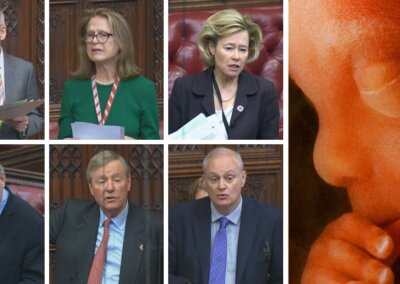Hundreds of pro-life campaigners gathered in the city of centre of Gibraltar yesterday to encourage people to vote against introducing abortion to the region in a referendum next month.
Roughly 1% of the Gibraltar’s population were in attendance carrying signs reading “Love Them Both,” “Pro-life Rock,” and “Pro-life is pro-women”. Over 500,000 would be in attendance if the UK’s pro-life march had the same proportional representation.
Members of Parliament voted 10-7, on 12 July 2019, to amend the Crimes Act to introduce abortion to the British Overseas Territory. However, rather than force the law through, a referendum will be held on 19 March 2020 due to a successful campaign from the Gibraltar Pro-life Movement.
The proposed changes would allow abortion in cases where a woman’s mental or physical health are at risk, with the approval of two doctors. Unborn babies would continue to be protected after the twelfth week of pregnancy.
6285 citizens signed a petition calling for any change in law to recognise “the pre-born’s indisputable right to life,” prompting MPs agree to hold a referendum on the issue.
The ballot paper question has been set as “Should the Crimes Amendment Act 2019, that defines the circumstances which would allow abortion in Gibraltar, come into force?” It will also allow those who are aged 16 and over to vote.
Lord Alton, who has spent over 40 years tirelessly championing the pro-life cause and is a patron of the Gibraltar Pro-Life Movement, was one of the key speakers at the event, which had the underlying message that Gibraltar should ‘save babies and vote no’.

Addressing a packed Grand Casemates Square, Lord Alton outlined how the unintended consequences of the abortion law in Great Britain had resulted in over 9,000,000 abortions since 1967 and over 200,000 annually, or over 600 each day, in England and Wales.
He said: “Gibraltar’s new law effectively allows abortion on demand, as in the UK”.
“Science teaches us that life begins at fertilisation. And science has moved on dramatically since abortion was legalised.
“When the UK’s obsolete limits were being set, we didn’t know what was happening in the womb. We do now. This is a law which flies in the face of science and humanity. Today we know so much more about the undeniable humanity of the child in the womb.”
Claire Culwell travelled from the US to share how she had survived an abortion that killed her twin, her premature birth and adoption by a loving family.
Encouraging people to vote in defence of the unborn, she said: “I am a twinless twin in the name of choice. I am one of many survivors of abortion. There is a domino effect to abortion. Not just the woman and the child but it is generation after generation that we see missing in the name of choice.
“You can do something about it here in Gibraltar. You can vote NO on 19th March. Please keep up your work and thank you for your commitment. You are fighting for the lives of people like me.”
Bernadette Goulding of Women Hurt spoke about her abortion experience and the lifelong challenges that resulted from it. She challenged the false message of choice saying:
“I was offered no other alternative – no other choice. I regret that bitterly.”












